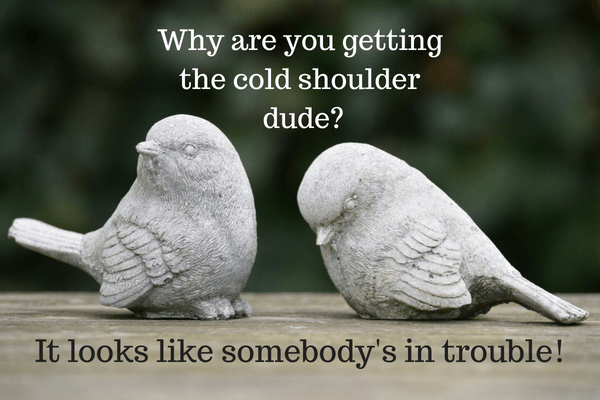
YouTube / iTunes / Spotify / Radio Public / Pocket Casts / Google Podcasts / Breaker / Overcast
Listen to ArtisanEnglish.jp posts & lesson intros here.
WotD: Cold shoulder
If you have friends or have ever been in a romantic relationship, there is a high possibility that you have either received a cold shoulder or given one.
You know you’re being given the cold shoulder when someone intentionally ignores you or acts very coldly towards you.
When this occurs, it is sometimes referred to as the cold shoulder treatment, especially in romantic relationships.
We’ve got an excellent example of this in today’s picture.
There doesn’t seem to be much love between these little lovebirds, does there?
I can’t tell their genders without turning them upside down.
I know that the little bird on the left, the one receiving the cold shoulder, seems to be apologetic for some reason.
I’ll venture a guess and say that it is a he.
I’ll say it’s a he because, from my relationship experience, the male usually has to apologize for doing something wrong.
But as I said before, I can’t know for sure without turning them upside down.
Both birds could both be he’s, for all I know.
To get back to the matter at hand, if we look at the bird on the right, it’s pretty easy to see that this bird is giving the cold shoulder for some reason.
It may be that they have been insulted or wronged in some way.
I guess even birds have their family or lovers quarrels from time to time.
When someone gives the cold shoulder, they intentionally ignore or treat the other person coldly.
It’s a helpful way to make a point that you are unhappy with whatever happened.
However, if the situation continues for too long, it can feel like cruel and unusual punishment for the receiver.
We are all social creatures at heart.
Denying the social aspects of a relationship can be effective in making a point, but only insofar as it doesn’t hurt the other person too much.
Giving the cold shoulder for too long may do more harm than good.
Flesch-Kincaid Readability Test
This post is understandable by someone with at least a 7th-grade education (age 12).
On the Flesch-Kincaid reading-ease test, this post scores 71.
The easier a passage is to read, the higher the score on a scale of 0 – 100.

